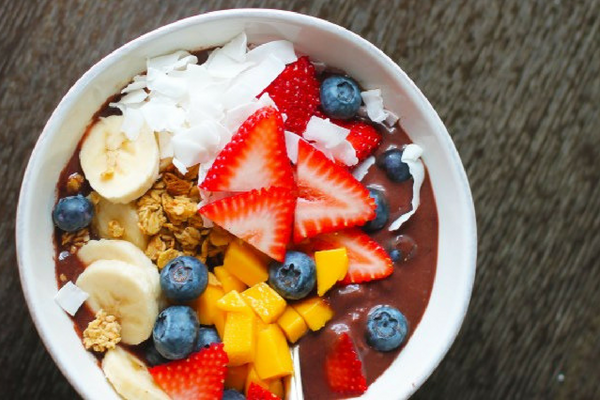
This post contains content that some readers may be sensitive to, including: eating disorders, mental illness and family arguments.
My disordered eating and negative relationship with my body began when I was about eleven or even earlier. I do know it was the summer between fifth and sixth grade because we had moved and so many of my childhood memories are categorized as “before moving” and “after moving”. Moving was suppose to be a fresh start for my family but it ended up being the start of a downward spiral for my mother.
I grew up in a tumultuous family with my mother being mentally ill and my father dealing with it the only way he knew how.
He worked during the day and went to school at night. As a result, meals consisted of whatever was in the fridge being thrown into a pressure cooker. If asked, my father would recount “it was pretty bad, but we survived”.
But my love-hate relationship with food and with my body didn’t start with my father’s cooking but it did begin at the dinner table. I remember sitting in intense silence out of fear of what might erupt. I am talking full blown fights, dishes flying, you just never knew what was going to happen. So I just sat with an intense pit in my stomach and feeling completely numb to the experience.
My way of dealing with this was to either eat slowly enough to be the last person at the table. I could then get rid of my food into the garbage unnoticed. Or I would not eat at all only to hoard sugar or heavy carbs later. All I know for sure was that I didn’t want to be there, so I used food to stuff down the ache I was feeling.
This would become a lifelong pattern. One I would revisit time and time again. This is not a sob story but a story of survival and resilience. My disordered eating became the friend who made sure I was safe. Perhaps not with the best of communication skills (she was and still is that 11 year old sitting alone at the kitchen table) but a trusted person come to protect me.
Binge, restrict, repeat would be my constant companion.
Life would settle down, only to have something throw me so off balance that my unhealthy relationship with food and my body would emerge.
I can think of the key moments in my life that threw me off balance:
- Puberty
- Body after giving birth
- Identity crisis – career woman to stay at home mom
- Significant deaths in the family
- Illness and surgeries
- Covid
 I’ve learned healthier coping skills. (I should add that these coping skills have come after years of therapy, books, yoga and group work). And when life gets crazy as life often does, my friend comes calling not to add suffering to my life but to remind me to take better care and connect body, mind and soul.
I’ve learned healthier coping skills. (I should add that these coping skills have come after years of therapy, books, yoga and group work). And when life gets crazy as life often does, my friend comes calling not to add suffering to my life but to remind me to take better care and connect body, mind and soul.
For the most part, I’m not talking about the more severe eating disorders that need hospitalization. I’m referring to the average person – like you and me – who make or may not restrict or binge, but who doesn’t want to be in their body or wants their body to be something different than what it is. Food is their weapon of choice, their mind is their ruler and their body is alien to them. This is no way to live!
The Stats
Earlier I wrote “disordered eating”. It’s because eating disorders can easily conjure up images of stick thin women with emaciated bodies. Or images of a woman hunched over a toilet purging after having eaten too much.
In actual fact, I am referring to “disordered eating” a descriptive phrase which entails emotional eating, overexercising, yo-yo dieting, and body dissatisfaction rather than the more severe disorders such as Anorexia, Bulimia, or Binge Eating Disorders which are a criteria defined by the American Psychiatric Association.
According to the National Institute of Mental Health, about one in every five women experience “disordered eating” at some time in their life. They come from all walks of life and all socioeconomic backgrounds.
 On my journey to connecting my body, mind and soul and becoming whole, I have utilized a whole host of tools that have worked for me. Some key ones I will mention here:
On my journey to connecting my body, mind and soul and becoming whole, I have utilized a whole host of tools that have worked for me. Some key ones I will mention here:
- Talk to someone. Share your story and get support. Misery loves isolation and you are too important to suffer in silence.
- Find a healthy outlet that you can lose yourself into other than food and body image stories. I do yoga but perhaps you garden, read, sew, knit, hike, sing, or write. There is a whole host of ideas – you are only limited by your imagination. Be there for yourself. Connect and integrate your body, mind and spirit.
- Put away the beauty magazines! Take a break from watching the lives of other people on social media. There is a billion dollar industry out there, trying to help but secretly saying “you are not good enough…but if you use my product, workout, diet, or clothes you can be!” So if you decide to utilize the support of this industry, choose it because you want to, not because you feel you have to in order to feel whole.
- Change the narrative of your story. Invite that disordered eating friend in and greet it with appreciation for what it is trying to tell you. It’s there to help you listen to your body and to find healthier ways to connect. You came into this life whole. Remember to treat yourself with the joy and respect you deserve.
Be kind to yourself and the journey you are on. I am. You’re a work in progress. I am. Connect back to your body. I work at it every day. It takes time and compassion.
If you or someone you know is suffering from a severe eating disorder, for support please visit https://www.nationaleatingdisorders.org/help-support/contact-helpline.
Are you looking for new tools and support to eat mindfully, navigate mental health challenges, and feel more at ease in your body. The Eat Breathe Thrive seven-week series is designed for anyone who wants to improve their relationship with food, body image, and overall mental health. This course combines gentle yoga, experiential activities, and community support.



















